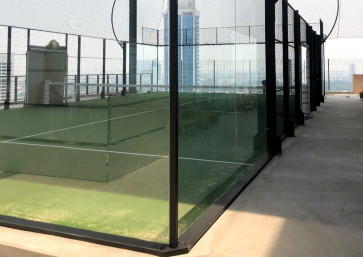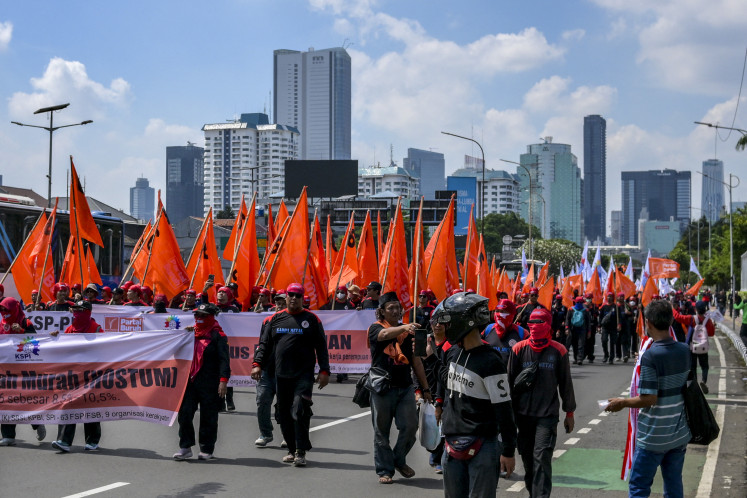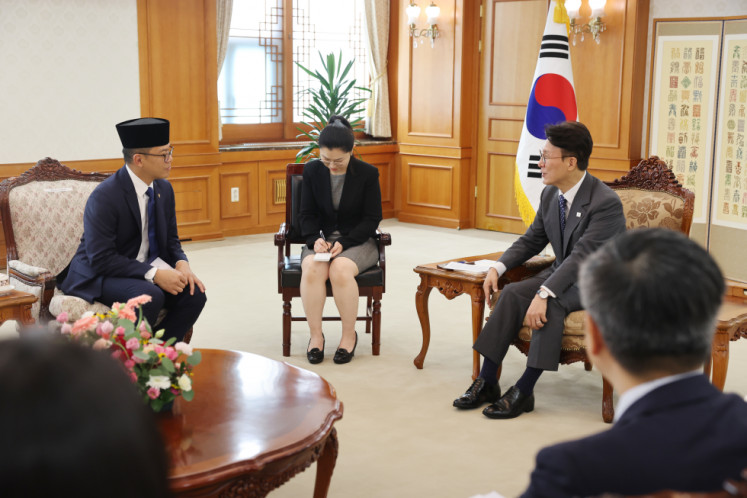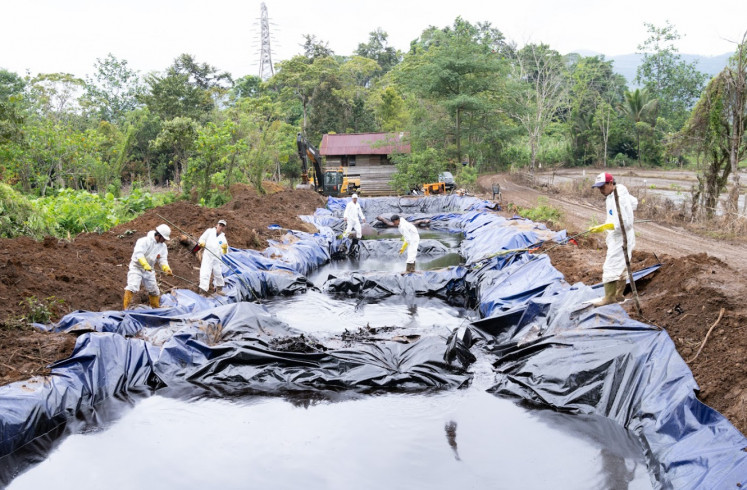Popular Reads
Top Results
Can't find what you're looking for?
View all search resultsPopular Reads
Top Results
Can't find what you're looking for?
View all search resultsFang Sheng: a ritual of compassion and conservation
Divine guidance: Ecoton executive director Prigi Arisandi holds a fish before releasing it into the Surabaya River
Change text size
Gift Premium Articles
to Anyone
D
span class="caption">Divine guidance: Ecoton executive director Prigi Arisandi holds a fish before releasing it into the Surabaya River. The environmental group provided guidance to Buddhists on what types of fish are suitable to be released into the river.
The silence in Wringinanom village, Gresik regency, East Java, was broken as a number of people headed toward a river while chanting prayers and waving flags in the scorching sun.
Arriving at the edge of the stream, they started releasing thousands of fish of different species into the Surabaya River, which flows through the regency.
They were Buddhists from Surabaya, Mojokerto in East Java, Jakarta and Taiwan conducting the Fang Sheng ritual on Dec. 22.
Fang means 'to release' and sheng means 'living creatures'.
Earlier, the Buddhist community joined the recital of paritta protective verses led by Master Hai Tao from the Buddhist Education Center (BEC), Taiwan. Through an interpreter, Hai Tao described what he called the exalted virtue of Fang Sheng.
'Fang Sheng is an action to imbue all living beings with compassion,' he indicated, referring to the principle of equality that says that despite the small size of certain organisms they should still be helped rather than harmed.
The Buddhists also carried bread to feed the fish, which were sprinkled with holy water before being freed by the ritual's participants. During the process, Hai Tao kept reciting prayers while his followers also waved flags that bore mantra words and sutra scriptural quotes.
Hai Tao voiced the expectation that the fish would thrive, without being threatened by or become a threat to other fish.
Ongko Digdojo, 60, a patron of Surabaya's BEC, said water constituted the basic component of creation of all living creatures so that humans should utilize and treat rivers in a balanced and sustainable manner.
Fang Sheng is a symbol of respect for the lives of all beings, big and small, in order to survive peacefully and happily without getting killed and harmed. 'Buddhist teachings value all lives as high as that of humans,' he added.
The animals released can be fish, birds, tortoises or others because in principle all living beings have the right to exist. In this way, according to Ongko, the world can be free from suffering caused by killing.
Therefore, Fang Sheng is one way of purifying humans' bad karma, especially the karma of killing, through this reverse action.
While ending animals' suffering by placing them in their habitat, 'this activity also helps maintain the equilibrium of nature,' he pointed out.
Going home: Buddhist monks release fish into the Surabaya River, symbolizing that the fish have returned home.
As this ritual is also a conservation effort, his center cooperates with the Ecological Observation and Wetlands Conservation (Ecoton) NGO, an independent local organization for ecosystem conservation and restoration.
Ecoton executive director Prigi Arisandi said the ritual had been an annual event in the river area over the last 10 years. 'This tradition has in fact helped conserve various endangered animals,' he noted.
Originally, many of the species released weren't suited to this river habitat, which is also a fish sanctuary. 'After our brief direction, the fish set free are now compatible with the ecosystem here,' Prigi added. This time the ritual released 50,000 fish of 11 species.
Holding a Master's degree in biology from Airlangga University, Surabaya, Prigi explained that these species had become scarce because of river contamination and harmful fishing methods. 'The stream has been polluted by industrial waste and people fishing have used electricity or potash instead of rods or nets,' he said.
The increasing population and diversity of fish species also serve as major indicators that a river is in healthy condition. 'The indicators aren't just the rates of chemical oxygen demand [COD] and biochemical oxygen demand [BOD],' he said.
The Surabaya River fish sanctuary is about 10 kilometers long, from the Mlirip Watergate in the Mojokerto regency to the Legundi Bridge in the Gresik regency, separating the three regencies of Mojokerto, Sidoarjo and Gresik.
The location of this fish release borders the fish sanctuary in Penambangan village, Balongbendo district, Sidoarjo regency. 'The Penambangan village head declared his area a fish bank in September 2015,' Prigi revealed.
The man, who born in Gresik in 1976, has made different attempts to arouse public awareness of the importance of clean river water through Ecoton since the beginning of 2000.
His hard work earned him a Goldman Environmental Prize Award in 2011 from the US, an honor for environmental activists at the grassroots level. Prigi is not alone in striving for clean rivers to suit animal and human needs.
Along with eight staff members, he is also assisted by Daru Setyo Rini, an Ecoton researcher and mother of three. Daru is now executive director of the Institute for River Restoration and Protection (Inspirasi), an educational unit of Ecoton.
The college lecturer in Surabaya pointed to the common public view regarding rivers as rubbish dumps and communal lavatories and at the many factories draining their waste into the streams.
One of the efforts of this doctorate student of ecosystem conservation at Brawijaya University, Malang, is building a river embankment with eco-hydraulic engineering by using wood and stones to induce mold growth. 'It functions like a coral reef to allow fish to spawn and hide,' she said.
Before you go: Buddhists and conservationists from Ecoton prepare thousands of fish to be released into the Surabaya River as part of the Fang Sheng ritual.
But in her view, no less important is providing consistent education for communities around rivers and members of the younger generation, particularly students. 'Catching spawning fish should be avoided and the fish caught should be medium-sized,' she added.
This instruction has been fruitful as shown by the latest fish census, listing a 30 percent increase over the population in 2014. Despite the Surabaya River's sanctuary status, Daru still considers more conservation programs as necessary for maintenance.
The Medan-born 39-year-old woman proposed that the regional government apply the zonal system to the 10-km-long river. 'There should be a core zone without any activity, a buffer zone without fishing and a utilization zone,' she said.
It's her hope that this fish sanctuary model will be a reliable system to be adopted for river maintenance in other regions. Healthy rivers will bring benefits to humans and serve various purposes such as tourism, traditional rituals and religious activities.
'Fang Sheng is an example that reminds us of the need to share with other living creatures and leaves the message that rivers are essentially the natural home of fish,' Daru concluded.
' Photos by JP/Nedi Putra AW












